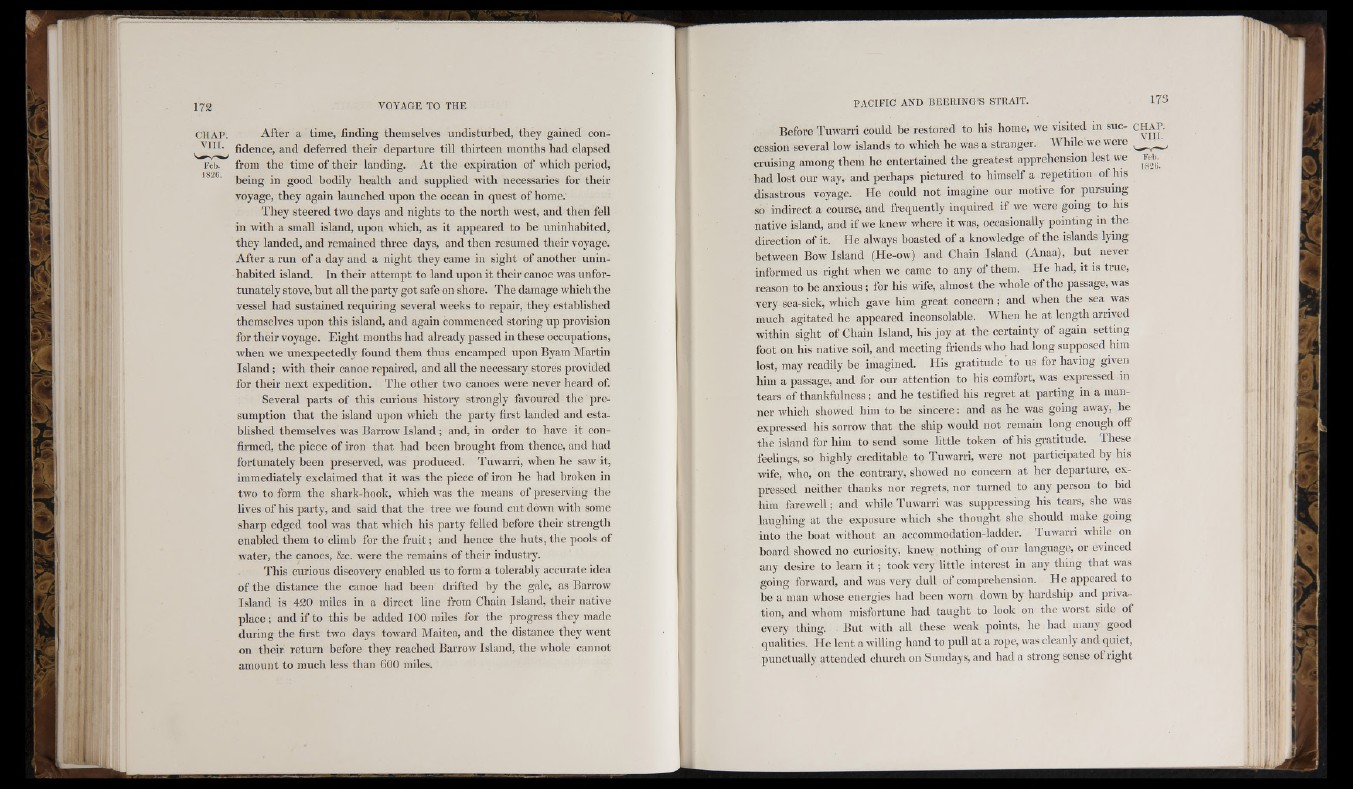
After a time, finding themselves undisturbed, they gained confidence,
and deferred their departure till thirteen months had elapsed
from the time of their landing. At the expiration of which period,
being in good bodily health and supplied with necessaries for their
voyage, they again launched upon the ocean in quest of home.
They steered two days and nights to the north west, and then fell
in with a small island, upon which, as it appeared to he uninhabited,
they landed, and remained three days, and then resumed their voyage.
After a run of a day and a night they came in sight of another uninhabited
island. In their attempt to land upon it their canoe was unfortunately
stove, but all the party got safe on shore. The damage which the
vessel had sustained requiring several weeks to repair, they established
themselves upon this island, and again commenced storing up provision
for their voyage. Eight months had already passed in these occupations,
when W’e unexpectedly found them thus encamped upon Byam Martin
Island ; with their canoe repaired, and all the necessary stores provided
for their next expedition. The other two canoes were never heard of.
Several parts of this curious history strongly favoured the presumption
that the island upon which the party first landed and established
themselves was Barrow Island ; and, in order to have it confirmed,
the piece of iron that had been brought from thence, and liad
fortunately been preserved, was produced. Tuwarri, when he saw it,
immediately exclaimed that it was the piece of iron he had broken in
two to form the shark-hook, w’hich w’as the means of preserving the
lives of his party, and said that the tree w’e found cut down witli some
sharp edged tool was that which his party felled before their strength
enabled them to climb for the fruit; and hence the huts, the pools of
water, the canoes, &c. were the remains of tlieir industry.
This curious discovery enabled us to form a tolerably accurate idea
of the distance the canoe had been drifted by the gale, as Barrow
Island is 420 miles in a direct line from Chain Island, their native
place; and if to this be added 100 miles for the progress they made
during the first two days toward Maitea, and the distance they went
on their return before they reached Barrow Island, the whole cannot
amount to much less than 600 miles.
Before Tuwarri could be restored to his home, we visited in succession
several low islands to which he was a stranger. YVhile w e were
cruising among them he entertained the greatest apprehension lest we
had lost our way, and perhaps pictured to himself a repetition of his
disastrous voyage. He could not imagine our motive for pursuing
so indirect a course, and frequently inquired if we were going to his
native island, and if we knew where it was, occasionally pointing in the
direction of it. He always boasted of a knowledge of the islands lying
between Bow Island (He-ow) and Chain Island (Anaa), but never
informed us right when we came to any of them. He had, it is true,
reason to be anxious ; for his wife, almost the whole of the passage, was
very sea-sick, which gave him great concern ; and w’hen the sea w’as
much agitated he appeared inconsolable. YVhen he at length arrived
within sight of Chain Island, his joy at the certainty of again setting
foot on his native soil, and meeting friends w’lio had long supposed him
lost, may readily be imagined. His gratitude to us for having given
him a passage, and for our attention to his comfort, w’as expressed in
tears of thankfulness; and he testified his regret at parting in a manner
which showed lihn to be sincere; and as he was going aw’ay, he
expressed his sorrow’ that the ship would not remain long enougli off
the island for liini to send some little token of his gratitude. These
feelings, so higlily creditable to Tuw’arri, were not participated by his
wife, who, on the contrary, show’ed no concern at her departure, expressed
neither thanks nor regrets, nor turned to any person to bid
him farewell; and while Tuw’arri was suppressing his tears, she was
laughing at the exposure wliicli she tliought she should make going
into tlie boat without an accommodation-ladder. Tuwarri while on
board showed no curiosity, knew notiiing of our language, or evinced
any desire to learn i t ; took very little interest in any thing that was
going forw’ard, and w’as very dull of comprehension. He appeared to
be a man wliose energies had been w'orn dow'ii by liardship and priva..
tion, and whom misfortune had taught to look on the worst side of
every tiling. But with all these iveak points, he liad many good
qualities. He lent a willing hand to pull at a rope, was cleanly and quiet,
punctually attended church on Sundays, and had a strong sense of right
s . .